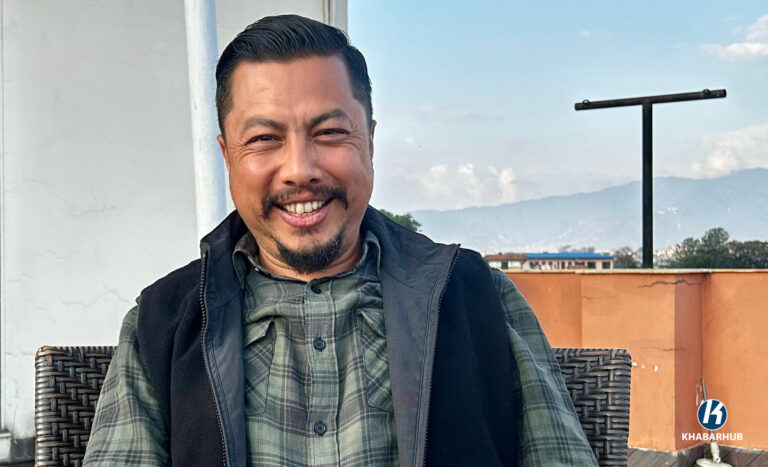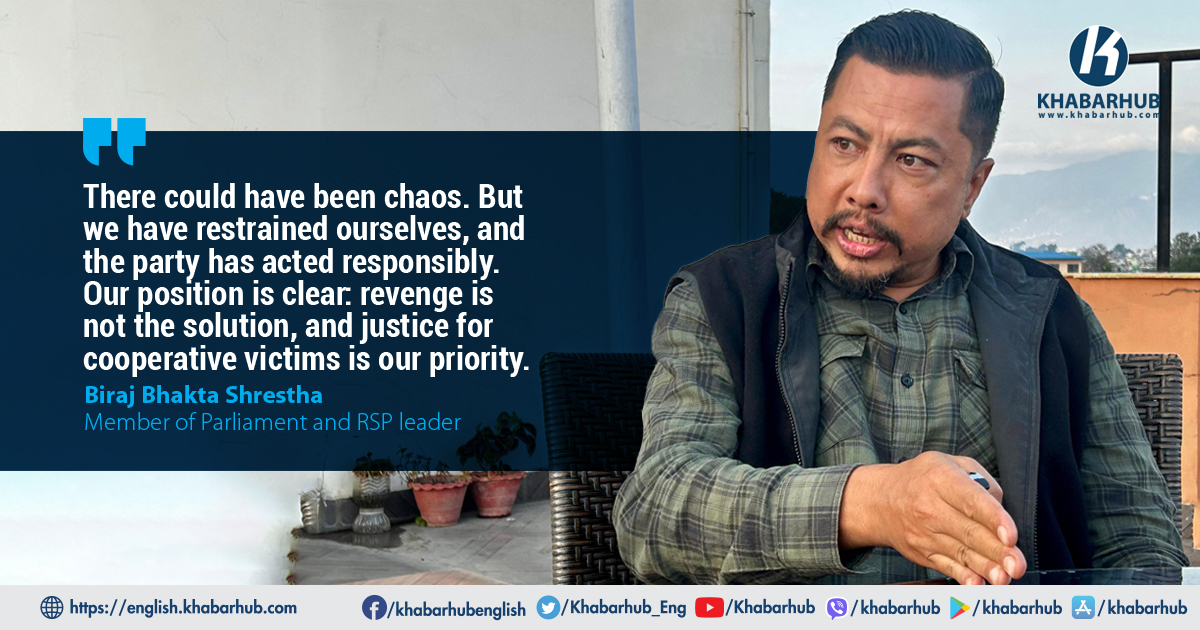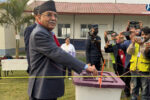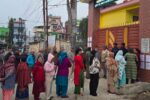KATHMANDU: Following the arrest of party Chairman Rabi Lamichhane, a key question has emerged within the Rastriya Swatantra Party (RSP): How will the party move forward?
This issue is not only a concern for party leaders and workers but has also sparked widespread public interest.
If the court does not sentence Rabi to jail after the completion of the Kaski police investigation and the filing of charges, he will resume his leadership of the party without any complications.
However, if the court does send Rabi to jail, questions arise: Who will take over as president of RSP? Or, as DP Aryal has suggested, will Rabi continue as Chairman indefinitely, “until he lives”?
Another pressing issue is whether the party will suspend Rabi from his role as chairman if he is found guilty, as per the existing legal framework.
If such a suspension occurs, who will step in to lead the party? Will it be DP Aryal, Dr. Swarnim Wagle, or perhaps another figure? These are crucial questions that are causing internal turmoil within RSP.
Since the arrest of Lamichhane, the party has been vocal in claiming that the state is acting out of vengeance.
The RSP is demanding that Lamichhane be kept out of custody while investigations proceed.
However, on Sunday, the Kaski District Court extended the investigation period by 13 days.
Lamichhane has been in custody with court permission. In the meantime, RSP leaders have expressed their willingness to accept the court’s decision, but the question remains: How will the party continue its movement amid these legal challenges?
To gain insight into how the party plans to navigate this complex situation, Khabarhub spoke with Biraj Bhakta Shrestha, a key ideological leader of the party and a Member of the House of Representatives (HoR).
Shrestha explained that the party is no longer in a state of “vacuum” and highlighted that there are vice chairmen in place to help manage the situation.
“How to reconcile the party remains an internal challenge,” he said. “However, we are working within the system. There are laws governing political parties, and we are about to hold our convention.”
Reflecting on the turmoil caused by Lamichhane’s arrest, Shrestha noted that other party members had protested and even reached the Parliament, which led to complications for RSP MPs.
“Now, we are a legally recognized party, but we have yet to fully establish ourselves politically,” he added. “The confusion stemmed from our party-building process.”
Shrestha further shared that after Lamichhane’s arrest, the party could not hold a central committee meeting for nine days. However, he affirmed, “Now we have recovered, and the party is moving forward regularly.”
Biraj Bhakta, who has emerged as a significant figure in the House of Representatives, is seen as a powerful and capable leader within RSP.
He became more widely known after a remark in Parliament, when he criticized the Speaker for not listening to him, telling him to “listen to the future Prime Minister.”
Some within the party consider Shrestha to be the ideological leader of the alternative wing within RSP, alongside key figures like DP Aryal and Dr. Swarnim Wagle.
While DP Aryal holds the position of Vice Chairman, Shrestha’s role is seen as a balancing force from an ideological perspective. His influence within the party continues to grow, as he navigates the complex issues at hand.
Legacy of Bibeksheel Party
Biraj Bhakta Shrestha has had a diverse and evolving political career. Before joining the party led by Rabi Lamichhane, Shrestha was a member of the Bibeksheel Sajha Party.
He first entered politics in 2074 BS, when he was elected as a member of the Bagmati Provincial Assembly under the Bibeksheel Sajha banner.
However, following the decline of Bibeksheel Sajha Party, Shrestha transitioned to become a leader within RSP.
In the 2017 state assembly elections, Shrestha was elected as a proportional representative from Bagmati Province, representing the then Bibeksheel Sajha Party.
However, after the dissolution of the party, he parted ways with the organization.
Shrestha, who was inspired by the political ideology and leadership of Ujjwal Thapa, a prominent figure in Bibeksheel Sajha, continues to regard Thapa as his political mentor.
He even keeps a photo of Thapa in his office as a symbol of respect and admiration.
After leaving Bibeksheel Sajha, Shrestha achieved a significant political milestone in the 2022 general elections, winning a seat as a Member of Parliament from Kathmandu Constituency No. 8.
He contested the election alongside social activist Suman Sayami, securing 10,105 votes, while Sayami received 5,879 votes under the ‘stick’ election symbol.
Shrestha’s response to Lamichhane’s arrest
Recently, RSP has been actively involved in street protests against the government following Rabi’s arrest in a cooperative scandal.
Despite these challenges, Shrestha has emphasized that the party will respect and adhere to the rule of law.
“We will follow the law,” Shrestha affirmed, underscoring the party’s commitment to legal processes.
Shrestha also indicated that RSP will adjust its approach to the movement going forward, engaging in new discussions with figures like Balendra Shah and CK Raut.
The party is rethinking its strategy to navigate the complex political environment, especially in light of Lamichhane’s ongoing legal troubles.
In response to the legal issues surrounding Lamichhane, Shrestha called for a fair and thorough investigation, urging that Lamichhane be allowed to defend himself without being detained.
“Chairman Lamichhane can only be imprisoned if the court finds him guilty,” Shrestha stated, emphasizing the importance of due process.
Shrestha also expressed concerns about the broader issue of cooperatives, which has become a significant point of contention for the party.
He urged the government to act swiftly to resolve the ongoing problems in the cooperative sector and to ensure that the savings of small depositors are returned.
The future of RSP
In a recent conversation with Khabarhub, Shrestha shared his thoughts on the future direction of RSP, especially in the wake of Lamichhane’s arrest and the shifting political landscape.
As an influential leader within the party, Shrestha’s perspectives are crucial in understanding the party’s plans for the coming months.
When Rabi Lamichhane was arrested, why did people take to the streets in protest? This matter is now in the hands of the court, isn’t it?
One thing is clear from our side — it’s evident that there is a sense of revenge at play here. Senior political leaders have also pointed this out. It seems that state power is being misused in this case.
Some who went to the court have said, “We have not entered the court.” I want to make it clear that it is not our approach to influence the judiciary. We have respect for the judiciary, and our chairman has also expressed this.
When Rabi was arrested, we called for an investigation but insisted that the legal process should proceed without interference.
Another issue is the inequality in how cases are handled. Those found guilty by the same parliamentary report are still free, while Rabi Lamichhane is in custody.
Why only him? Is it because we raised our voices in Parliament? Is it because the old parties are targeting our party? Is it because we stand against corruption and for good governance? Our stance is clear: Criminals should not be granted immunity, but politics should not be criminalized either.
It has now been over four hours since Rabi Lamichhane’s statement was taken in custody.
The investigation deadline has been extended multiple times — sometimes seven days, sometimes 10, and sometimes even 13.
But Rabi is not a person who would run away. I am not asking for immunity for him.
Many things have been misinterpreted here. In a rule-of-law state, the legal provisions must be respected, and the facilities provided by the law should be available to all.
Our position is that we will accept the court’s decision. Yes, our party has made mistakes — that’s not something we deny.
However, these mistakes are natural in the early stages of forming a new political party. We have requested that Ravi be kept out of custody and that a fair investigation be conducted.
We are all witnesses to the criminal incidents that have taken place in this country. Many individuals have been absolved of these crimes.
We have made it clear: no one, not even Rabi, should be given immunity from the law. Our chairman has remained in custody, agreeing to cooperate fully with the investigation.
It seems like this republic has failed to live up to its promise. What we are saying is that the cooperative issue existed before Rabi entered politics.
It was a mess that no one could safely address. The government decided to detain people without clear justification. Rabi protested against this government bias in Tundikhel.
I am worried that citizens will lose faith in the government, the leadership, and the system.
A friend from Dolakha was planning to go abroad but ended up spending 11 days in jail during the investigation.
This is not what happens in a law-abiding state. Looking at recent incidents on social media, it’s clear that this is not the result of a legal system — it looks more like an act of revenge.
While it may seem like the target is Rabi and RSP now, such tactics will ultimately undermine everyone. This is what happened during the Panchayat era. We did not envision this in a republic.
Rabi’s arrest is not the only issue here. There are currently 576 people in jail due to cooperative fraud. Is revenge only a problem when Rabi is arrested? Is that the real question?
Most importantly, who is seeking justice for the actual victims of the cooperative scandals?
Some cooperative victims have not even been able to take to the streets to protest.
Many have been too fearful or powerless to do so. Who will listen to the suffering of those who saved fifty or a hundred rupees?
The issue of justice for cooperative victims should be brought to the forefront.
According to the inquiry committee’s report, Lamichhane was not found to be involved in the scam.
There could have been chaos. But we have restrained ourselves, and the party has acted responsibly. Our position is clear: revenge is not the solution, and justice for cooperative victims is our priority.
However, the next step involved investigating the case of checks being issued in his name within the company.
The committee was formed to investigate government fraud, but even after reaching the company, investigations have continued.
While Rabi may have been mentioned in one part of the report, what about the other sections?
If people in those sections are to be investigated, they should be treated the same way as Rabi.

A much stronger case has emerged from the media. There is no distinction made between the people involved.
The law must apply equally to everyone, but it seems like our people are being treated differently.
The parliamentary report states that 40 cooperatives are involved, with a total of 87 billion rupees at stake.
However, beyond this report, the state’s investigative bodies — including constitutional commissions — seem to have done little. Where have they been? What have they investigated?
After obstructing the work of Parliament, we have accepted the opposition’s viewpoint, which acknowledges the problems in over 500 cooperatives.
The issue of legal loopholes created by the government still remains unaddressed.
Rabi Lamichhane, GB Rai, and others mentioned in the case — including 576 individuals — are also victims of these loopholes.
Shouldn’t we reconsider the laws that allowed these individuals to escape accountability? People have stolen from the public by exploiting legal loopholes.
Political patronage has enabled misappropriation of funds in cooperative boards.
The regulatory agencies tasked with overseeing these organizations have been dismantled.
Shouldn’t the government take responsibility for the three-pillar economic policy in the country? Shouldn’t it be integrated into financial governance and the overall system?
Absolutely. The government should take responsibility for the three-pillar economic policy.
It should be brought into the broader financial governance framework and regulated properly.
Today, cooperatives operate under the Cooperative Act, but when problems arise, there should be checks and oversight from the Nepal Rastra Bank and the Ministry of Finance.
Unfortunately, there is no such system in place, and it has severely affected our economy.
The informal economic system has distorted our economic data and presented a misleading picture of the actual state of affairs, simply because it operates outside official channels.
You mentioned cooperatives and their growing influence. How do you view their role today in Nepal’s economy?
In the context of the three-pillar economy, cooperatives play a vital role, particularly for small savers.
When I was involved in the tourism business, I didn’t have the capital to purchase even a computer.
So, I took a loan from a cooperative and paid it back over 17 months. Today, cooperatives are attempting to purchase land worth billions of rupees.
They have grown in size to the point where they resemble banks. However, the regulatory environment around cooperatives is extremely lax, and that’s where the problem lies. We need tighter regulation and oversight.
What is your party’s stance on the issue of cooperative victims? You’ve spoken about pushing for solutions. Could you elaborate on that?
We have been clear about this. Simply seeking justice for cooperative victims is no longer enough.
We must push for real solutions and hold the government accountable.
I have warned our party members that we need to focus on creating an impartial and independent authority to oversee cooperatives.
This authority should work towards resolving the issues faced by the victims — especially those with savings below 5 lakhs — and ensuring they get their money back.
It’s crucial that we not only demand justice but also demand practical, actionable solutions.
Why, then, was the recent street protest only focused on the release of the chairman, Rabi Lamichhane? Why weren’t these broader issues of solution brought up?
That’s an important question. But we have to understand it from the perspective of social psychology as well.
Rabi Lamichhane has gained popularity due to his communication skills, his ability to ask the right questions, and his direct approach.
The party was formed largely around his popularity and his style of leadership. That’s why people came out to protest for his release.
However, that does not mean we have forgotten the bigger issues. The party is also committed to finding solutions to the cooperative crisis.
We’ve addressed his supporters respectfully, and we’re actively working on bringing these issues to the forefront.
So, you think the party can balance both — addressing the chairman’s situation while also tackling the broader issues facing cooperatives?
Yes, we can. If our party fails to address the larger issues and just focuses on one individual, then it would be like saying that the crowd has no face.
Rabi’s supporters, intellectuals, and senior figures in the party have spoken out in his defense because they believe in his leadership.
But as a responsible party, we also have to speak for the people affected by the cooperative frauds. We cannot ignore their suffering.
In the West, people spend today and pay tomorrow. Here, we work hard all our lives to build small assets. We need to be mindful of this when addressing financial behavior.
If we didn’t have a party system, this movement could have escalated into violence.
There could have been chaos. But we have restrained ourselves, and the party has acted responsibly. Our position is clear: revenge is not the solution, and justice for cooperative victims is our priority.
Regarding the ongoing legal process, what is your view on the government’s involvement? You’ve raised concerns about the executive interfering with the judiciary.
We wish the court the best in its proceedings, but we do have concerns.
The chairman has said that he hasn’t been allowed to meet with his lawyer, which raises serious questions about the fairness of the process.
The executive must not interfere with the judiciary. The rule of law should be upheld, and we hope the court remains independent in making its decision.
How does your party explain its position to the public, especially in light of the protests and the legal issues surrounding the chairman?
We explain our position through our actions. We don’t engage in violence. Instead, we act with restraint and moderation.
The people have sent us to Parliament as the fourth-largest party, and we have not forgotten that responsibility.
We have actively participated in important debates, and through those discussions, we have refined our understanding of the issues at hand.
That’s how we continue to work towards solutions. We aim to be a responsible party, both in words and actions.
Recently, Chabilal Joshi made a statement alleging that Rabi Lamichhane instigated GB Rai and him to invest cooperative funds in the media. With the case now in court, do you think the situation regarding the cooperatives will become clearer for the chairman?
This cooperative scandal has indeed had a significant impact on our party’s activities.
Now that the case is in court, I will refrain from commenting on any specific court decision.
We operate based on facts and data in our justice system, and I hope the process will reveal the truth.
There was no need for us to respond further to it because we are aware of the situation and are confident in the judicial process.
Institutions should always be stronger than individuals in a democracy. I’ve always said, “If the priest is bad, the temple cannot be blamed.”
The judiciary is the cornerstone of democracy, and we have the utmost respect for it.
Our only point is that Rabi Lamichhane is not someone who would flee the country.
He is the former Deputy Prime Minister and Home Minister. That’s why we have requested that the investigation be carried out without him being detained.
Tomorrow, if circumstances change and we form a strong government, the tables may turn.
Should we detain people for investigation or show respect for their rights until the court makes its decision?
This is the dilemma we face. Yes, our party has its flaws, but there is no question about our intentions or actions.
Some have said that Rabi Lamichhane has not accepted any wrongdoing. Do the people believe he was unaware that cooperative funds were being invested in Gorkha Media?
In our country, many things happen through informal arrangements and trust, without written agreements.
This is a cultural issue. For instance, a flower shop owner might be given a balance and trusted to pay within two months. The law must adapt to our social realities.
Can the government be allowed to do this in a republic? It’s the people’s right to protest against actions they disagree with. The government must recognize and respect that right.
The difference between Western economies and ours is that theirs are based on a ‘credit economy,’ while ours is based on ‘savings.’
In the West, people spend today and pay tomorrow. Here, we work hard all our lives to build small assets. We need to be mindful of this when addressing financial behavior.
At the moment, we must wait for the court’s findings and the Companies Act to provide clarity.
This is a complex issue that challenges financial behavior. I don’t have a direct answer to that question at this time.
It’s been said that the truth about the cooperative scandal will only be fully understood once GB Rai is arrested. Do you think the truth is still unclear?
Yes, we are still only seeing part of the truth. The full facts will only come out when GB Rai is questioned.
As for Rabi Lamichhane, he should have addressed this matter before entering politics and leaving television.
Once he entered politics, his flaws became more evident. But there are bigger issues at play here. Some things that were hidden from the public eye are now coming to light.
According to the Companies Act, those involved — including Rabi and GB Rai — must be held accountable. If anyone tries to evade justice, the court’s decision will be crucial.
Despite multiple changes in the Home Ministry, GB Rai was not arrested. Some have even alleged that GB Rai was protected when Lamichhane was Home Minister. What’s your take on this?
That claim seems to be completely false. It’s clear that the chairman’s political career created pressure to arrest GB Rai. But to my knowledge, he was not protected.
When we received information about GB Rai, we would have questioned him as well. I am confident that Rabi Lamichhane did not shield him.
Who, then, is protecting GB Rai?
This situation is more about the system than individuals. We need to move away from personality-centered politics and focus on facts.
The real issue here is that many board members in the cooperatives received political protection, and it seems that GB Rai may have benefited from similar political patronage. This is something that needs to be investigated.
If the government, the courts, and the international community work together, we will be able to uncover the truth about GB Rai’s activities.
I’ve heard that there’s an opportunity to apprehend him, particularly because Nepal lacks export treaties with many countries.
The Nepal Police are excellent through Interpol, and it’s likely that he will be arrested sooner or later.
How do you see the investigation of Lamichhane proceeding? He has given a statement to the inquiry committee and the court, and he has been detained for over 25 days. The deadline for his detention has been extended again by 13 days. Will he be able to get out if he meets his obligations?
As of now, the investigation is ongoing, and we must wait for the evidence to unfold.
I cannot make any conclusions at this stage because I am committed to respecting the rule of law.
The situation has been complicated by the extended detention period. There is no automatic provision in Nepal for someone to be released just by paying obligations. It depends on what the investigation and evidence reveal.
The extension of the deadline is concerning, though. It seems there is a deliberate delay in this investigation, which is causing distress.
The government must fulfill its promises regarding cooperative authorities, boards, and departments. It’s not enough to simply talk about returning money to savers who invested below 500,000 rupees and giving justice to the victims.
It raises questions about the intentions behind these extensions. We also need to be mindful that this could be a form of pressure from the government.
You’ve mentioned that when there were protests outside, people claimed that Rabi was under stress in custody. Do you believe this is due to government pressure?
It’s clear to me that there’s an attempt to exert pressure from above. We’ve seen this with the arrest of our party’s MP Ashok Chaudhary from Baluwatar.
Can the government be allowed to do this in a republic? It’s the people’s right to protest against actions they disagree with. The government must recognize and respect that right.
I’ve witnessed the 2046 BS (1990) movement, and I believe research and investigations must be carried out according to democratic principles.
After the Baluwatar incident, our friend Pukar Bam was unjustly subjected to suffering. I don’t tolerate discrimination, whether it’s against people or animals. The government should serve the people, all 30 million of us.
The deadline for Rabi’s detention has been extended by 13 days. How do you feel about this?
The lawyers had already suggested that the investigation should be carried out without special custody, but it’s disappointing that the detention period keeps getting extended without sufficient progress in the investigation.
The case has not even been formally registered in court yet. Extending the investigation deadline in this manner only serves to frustrate everyone involved.
The situation with the five other individuals involved is similar — their deadlines have been extended without any real investigation.
I’m surprised by the lack of clarity here. In a legal state, this kind of treatment is unjust.
The relevant authorities need to provide clear answers about what is happening.
The movement here has not gained much traction, despite having the support of 11.3 lakh voters. Why is that?
If 11.3 lakh people were to rise up, the government system would likely change. But we have not called on the people to protest, and we have shown restraint.
We view this as a test given to us by the people. Some voters from other parties also cast their ballots for us, and I believe they want us to be responsible. I would prefer if these 11 lakh people did not have to take to the streets.
Our movement has evolved. We are now advancing it through ideology and dialogue, not through street protests.
However, we remain vigilant and continue to raise our voice, not to promote revenge, but to seek justice for cooperative victims.
Why haven’t other alternative forces supported your movement?
This is precisely why we need a formal dialogue process. We’ve started engaging in dialogue with leaders like CK Raut and Balendra Shah, the Mayor of Kathmandu.
We are also in constant discussions with emerging powers and smaller parties.
RSP takes its responsibility to engage with smaller parties and activists seriously.
The weight of smaller parties can sometimes exceed that of larger, more established ones, but this has not yet been fully institutionalized.
Perhaps the next wave of alternative politics will be a bit more refined. I still value ideological clarity and policy coherence. My foundation remains rooted in the principles I learned during my time with Bibeksheel.
We need more communication with smaller and alternative forces, not just for this issue but for the broader good of the people.
How do you propose to return the 87 billion rupees lost in the cooperative fraud to the victims?
The government must fulfill its promises regarding cooperative authorities, boards, and departments. It’s not enough to simply talk about returning money to savers who invested below 500,000 rupees and giving justice to the victims.
There must be a concrete plan to address the 87 billion rupees that were lost, and the government needs to listen to the people on this issue.
The right measures must be implemented, and we will continue to protest until we get a solution.
We believe that the government should allocate some funds through the central bank to address the needs of savers between 1,000 and 5,000 rupees.
Additionally, the government should sell off the assets of those involved in cooperative fraud and return the money to the victims. It’s the government’s responsibility to act in these matters.
If there’s a better proposal to address the situation, we are open to it, but there must be a solution.
The government spoke about helping victims when it first came to power, but to date, no real action has been taken. We still have not received any information on this.
Looking back at your old party, Bibeksheel, what do you remember the most?
I keep a photo of Ujjwal Thapa in front of my seat. He is my political guru, and I remember the movement and his leadership fondly. I miss him deeply.
His values were simple yet powerful: the government should serve the people, the state should be beneficial, and society should be prudent and enterprising. I often look at his photo and laugh, and sometimes I feel emotional.
I was very close to him, and we traveled together, which made our bond even stronger.
He gave me a framework for thinking, especially for the 21st century. The principles I learned from him have stuck with me.
I believe the youth should focus on entrepreneurship, and local governments should be more effective.
These are ideals I still stand by and advocate for. I consider myself lucky to have come from his political schooling. What I am today, I owe a lot to him.
You mentioned that you’ve been reviewing Bibeksheel’s manifesto and principles. Is there a sense of disillusionment now that RSP is in the House of Representatives but still hasn’t achieved its full potential?
We made significant progress with Bibeksheel through the Rolpa and Janakpur conventions, where we strengthened our political platform and developed clear policy recognition.
RSP has reached the House of Representatives, but the process of transformation and fulfilling our goals is far from complete. I still believe that a party should act with prudence, not recklessness.
There are lessons to be learned from past mistakes made by alternative forces.
The by-elections are an opportunity to assess the current state of RSP. It’s a critical moment for us to gauge our position and test our influence.
Perhaps the next wave of alternative politics will be a bit more refined. I still value ideological clarity and policy coherence. My foundation remains rooted in the principles I learned during my time with Bibeksheel.
I also often think about how we got here. If President Rabindra Mishra hadn’t joined the RPP, would we be where we are now? These are the kinds of questions I’ve raised in the central committee meetings.
The party has emphasized non-violence and political respect. But recently, there have been accusations that you clashed with the police in Pokhara. Did you forget these values?
I appreciate the question. There’s nothing worse than forgetting the values I’ve come from. We haven’t thrown a single stone.
We have always been a defender of non-violence and respect for others. At that moment in Pokhara, I was reacting to the situation, but I did not engage in violence. I have always maintained that power and authority should be held accountable.
How do you see your political journey now? You’ve mentioned you would stop doing politics after 50. What does that mean for the future?
Yes, my plan is not to remain in active politics once I turn 50. After that, I want to continue as a well-wisher of the party, offering guidance and support without seeking positions or power.
Politics should not be driven by greed. I’m happy to help, but my goal is to elevate politics to a higher level before I step back.
Your father-in-law, Sharat Singh Bhandari, has been a long-standing figure in politics and has served as a minister multiple times. Do you ever feel the pressure to follow in his footsteps?
I don’t intend to interfere with his political rights. He has earned his place through the people’s mandate. I don’t see any reason to disrupt that.
I do, however, believe that we need clearer provisions in the constitution regarding the eligibility for parliamentarians and ministers.
But when it comes to him, I respect his experience and his role. My role is simply to support, not to overshadow or compete with his career.
I sometimes joke with my wife about it, but in the end, he was elected by the people, and that’s what matters.
RSP is participating in the local by-elections on December 1. How are the preparations going?
We’re excited about the opportunity. We’ve made it clear that the local level elections should proceed according to the Local Level Operation Act, with district committees given the authority to select candidates.
The by-elections are an opportunity to assess the current state of RSP. It’s a critical moment for us to gauge our position and test our influence.
We are hopeful for good results, but more importantly, this is a time to test our party’s structure and readiness.
It’s a valuable opportunity for us to strengthen our presence at the local level, and we’re committed to making the most of it.









Comment